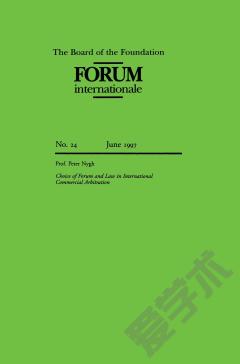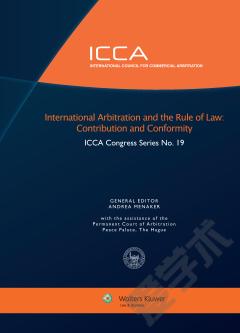International Arbitration and Forum Selection Agreements: Drafting and Enforcing —— Drafting and Enforcing
----- 国际商事仲裁和法院选择协议:起草与执行(第五版)
No lawyer involved in international transactions can afford to ignore this authoritative guide to planning and drafting international arbitration agreements and forum selection clauses. It includes clear, practical explanations of the advantages and disadvantages of different forms of dispute resolution provisions, and detailed discussion of all elements of drafting arbitration and choice-of-court clauses. The primer includes scores of revised model arbitration and forum selection clauses, providing precise wording for use in a wide range of commercial contexts. It is designed for easy reference and use by both general practitioners and specialists. Each model clause is thoroughly annotated, including with reference to relevant scholarship and jurisprudence. The primer is authored by Gary B. Born, one of the world's pre-eminent authorities on international commercial arbitration and litigation. He is the author of "International Commercial Arbitration" (2d ed. 2001) and "International Civil Litigation in U.S. Courts" (3d ed. 2000), and a leading international arbitration practitioner. He has brought a wealth of practical experience and academic achievement together to produce a practical, authoritative guide to drafting and planning international arbitration and forum selection agreements. This second edition, extensively updated and revised, includes such features as the following: scores of sample arbitration and forum selection clauses, including leading institutional arbitration clauses, ad hoc clauses and comprehensive guidance on drafting individualized clauses; sample language relating to discovery, language, arbitrators' qualifications, confidentiality, waivers of immunity, interim relief, fast-track procedures, costs, consent to service of process, and other commonly-used provisions; descriptions of all leading international arbitration institutions (ICC, LCIA, AAA, ICSID) and most major regional arbitration institutions, including commentary on individual characteristics of each institution; practically-oriented discussions of the importance of the arbitral seat, means of selecting arbitrators, language, and other key issues; and detailed guidance on drafting choice-of-law clauses (including samples) and their role in dispute resolution. It also contains a practical analysis of enforcement of international arbitration and forum selection agreements, as well as national court judgements and international arbitral awards, under leading conventions and national laws. An appendix contains texts of the New York and European Conventions and the UNCITRAL Model Law, as well as arbitration rules of leading arbitral institutions. Designed for easy reference and use by both general practitioners and specialists, the book is required for any international practitioner or corporate counsel engaged in international matters.
{{comment.content}}








 京公网安备 11010802027623号
京公网安备 11010802027623号